Уильям Моэм - Английский язык с У. С. Моэмом. На окраине империи. Рассказы
- Название:Английский язык с У. С. Моэмом. На окраине империи. Рассказы
- Автор:
- Жанр:
- Издательство:неизвестно
- Год:неизвестен
- ISBN:нет данных
- Рейтинг:
- Избранное:Добавить в избранное
-
Отзывы:
-
Ваша оценка:
Уильям Моэм - Английский язык с У. С. Моэмом. На окраине империи. Рассказы краткое содержание
Метод чтения Ильи Франка
Английский язык с У. С. Моэмом. На окраине империи. Рассказы - читать онлайн бесплатно полную версию (весь текст целиком)
Интервал:
Закладка:
It was from this journey that Bateman Hunter was now returned (именно из этой поездки сейчас и вернулся Бейтман Хантер).
mystery ['mIst(q)rI], allow [q'lau], ruddy ['rAdI], journey ['dZWnI]
"There's some mystery and I'm going to clear it up. That's the only way to do it."
"Oh, Bateman, how can you be so good and kind?» she exclaimed.
"You know there's nothing in the world I want more than your happiness, Isabel."
She looked at him and she gave him her hands.
"You're wonderful, Bateman. I didn't know there was anyone in the world like you. How can I ever thank you?"
"I don't want your thanks. I only want to be allowed to help you."
She dropped her eyes and flushed a little. She was so used to him that she had forgotten how handsome he was. He was as tall as Edward and as well made, but he was dark and pale of face, while Edward was ruddy. Of course she knew he loved her. It touched her. She felt very tender towards him.
It was from this journey that Bateman Hunter was now returned.
The business part of it took him somewhat longer than he expected (деловая часть /поездки/ заняла больше времени, чем он ожидал) and he had much time to think of his two friends (и у него было много времени подумать о двух своих друзьях). He had come to the conclusion that it could be nothing serious that prevented Edward from coming home (он пришел к выводу, что не могло быть ничего особенно серьезного, что не позволяло Эдварду вернуться домой), a pride, perhaps, which made him determined to make good (возможно, гордость, которая наполняла его решимостью преуспеть; to make good — сдержать слово; преуспевать, делать успехи ) before he claimed the bride he adored (прежде чем потребовать руки невесты, которую он обожал; to claim — требовать; предъявлять требования; заявлять о своих правах на что-либо ); but it was a pride that must be reasoned with (но с этой гордостью необходимо бороться; to reason with — уговаривать, урезонивать ). Isabel was unhappy (Изабелла была несчастлива). Edward must come back to Chicago with him and marry her at once (Эдвард должен вернуться в Чикаго вместе с ним и немедленно жениться на ней).
conclusion [kqn'klu: Z(q)n], determined [dI'tWmInd], unhappy [An'hxpI]
The business part of it took him somewhat longer than he expected and he had much time to think of his two friends. He had come to the conclusion that it could be nothing serious that prevented Edward from coming home, a pride, perhaps, which made him determined to make good before he claimed the bride he adored; but it was a pride that must be reasoned with. Isabel was unhappy. Edward must come back to Chicago with him and marry her at once.
A position could be found for him in the works of the Hunter Motor Traction and Automobile Company (для него можно было бы найти местечко на заводе "Компании Хантеров по производству тяговых электродвигателей и автомобилей"; traction — тяга/для наземного транспорта/ ). Bateman, with a bleeding heart, exulted at the prospect of giving happiness (Бейтман, хоть его сердце и обливалось кровью, ликовал при мысли о том, что он подарит счастье; prospect — вид, панорама; перспектива, планы на будущее ) to the two persons he loved best in the world at the cost of his own (двум людям, которых он любил больше всего в мире, ценой собственного /счастья/). He would never marry (он никогда не женится). He would be godfather to the children of Edward and Isabel (он будет крестным отцом детям Эдварда и Изабеллы), and many years later when they were both dead (и много лет спустя, когда они оба умрут) he would tell Isabel's daughter how long, long ago he had loved her mother (он расскажет дочери Изабеллы, как очень, очень давно, он любил ее мать). Bateman's eyes were veiled with tears (глаза Бейтмана подернулись слезами; to veil — закрывать вуалью, покрывалом; veil — вуаль ) when he pictured this scene to himself (когда он представил себе эту сцену; to picture — изображать/на картине/;представлять себе ).
exult [Ig'zAlt], godfather ['gOd" fQ: Dq], veiled [veIld], scene [si: n]
A position could be found for him in the works of the Hunter Motor Traction and Automobile Company. Bateman, with a bleeding heart, exulted at the prospect of giving happiness to the two persons he loved best in the world at the cost of his own. He would never marry. He would be godfather to the children of Edward and Isabel, and many years later when they were both dead he would tell Isabel's daughter how long, long ago he had loved her mother. Bateman's eyes were veiled with tears when he pictured this scene to himself.
Meaning to take Edward by surprise (намереваясь застать Эдварда врасплох; surprise — удивление; неожиданное действие/особ. нападение/ ) he had not cabled to announce his arrival (он не стал отправлять телеграмму, чтобы сообщить о своем прибытии; to cable — телеграфировать; cable — кабель ), and when at last he landed at Tahiti (и, когда он, наконец, высадился на Таити) he allowed a youth, who said he was the son of the house (он позволил юноше, который сказал, что он был сыном хозяина), to lead him to the Hotel de la Fleur (отвести себя в гостиницу «Отель де ля Флёр» ). He chuckled when he thought of his friend's amazement on seeing him (он посмеивался, когда представлял себе удивление своего друга, когда тот увидит, как он), the most unexpected of visitors, walk into his office (самый неожиданный из посетителей, входит в его контору).
"By the way (между прочим)," he asked, as they went along (спросил он по дороге: «пока они шли вместе /к гостинице/»), "can you tell me where I shall find Mr. Edward Barnard (вы мне не подскажите, где я могу найти мистера Эдварда Барнарда)?"
"Barnard?" said the youth. "I seem to know the name (кажется, я знаю эту фамилию)."
"He's an American (он американец). A tall fellow with light brown hair and blue eyes (высокий парень со светлыми каштановыми волосами и голубыми глазами). He's been here over two years (он здесь уже более двух лет)."
"Of course (ах, да, конечно). Now I know who you mean (теперь я понял, о ком вы говорите). You mean Mr. Jackson's nephew (вы имеете в виду племянника мистера Джексона)."
"Whose nephew (чьего племянника)?"
"Mr. Arnold Jackson."
"I don't think we're speaking of the same person (не думаю, что мы говорим об одном и том же человеке)," answered Bateman, frigidly (холодно ответил Бейтман; frigid — холодный; бесстрастный ).
announce [q'naVns], arrival [q'raIv(q)l], amazement [q'meIzmqnt], unexpected ["AnIk'spektId], nephew ['nefju:, ' nev — ], frigidly ['frIdZIdlI]
Meaning to take Edward by surprise he had not cabled to announce his arrival, and when at last he landed at Tahiti he allowed a youth, who said he was the son of the house, to lead him to the Hotel de la Fleur. He chuckled when he thought of his friend's amazement on seeing him, the most unexpected of visitors, walk into his office.
"By the way," he asked, as they went along, "can you tell me where I shall find Mr. Edward Barnard?"
"Barnard?" said the youth. "I seem to know the name."
"He's an American. A tall fellow with light brown hair and blue eyes. He's been here over two years."
"Of course. Now I know who you mean. You mean Mr. Jackson's nephew."
"Whose nephew?"
"Mr. Arnold Jackson."
"I don't think we're speaking of the same person," answered Bateman, frigidly.
He was startled (он был встревожен). It was queer that Arnold Jackson, known apparently to all and sundry (было странным, что Арнольд Джексон, несомненно известный всем и каждому; sundry— неопределенное число /людей, вещей/ ), should live here under the disgraceful name (живет здесь под этим позорным именем) in which he had been convicted (под которым он был осужден). But Bateman could not imagine whom it was that he passed off as his nephew (но Бейтман и представить себе не мог, кто же выдавал себя за его племянника; to pass off— исчезать; выдавать себя /за кого-либо/ ). Mrs. Longstaffe was his only sister and he had never had a brother (миссис Лонгстаф была его единственной сестрой, и у него никогда не было брата). The young man by his side talked volubly in an English (молодой человек /шедший/ рядом с ним, легко разговаривал на /своеобразном/ английском) that had something in it of the intonation of a foreign tongue (в котором присутствовало что-то из интонаций какого-то иностранного = другого языка), and Bateman, with a sidelong glance, saw, what he had not noticed before (и Бейтман, искоса взглянув /на него/, увидел то, чего он не заметил раньше), that there was in him a good deal of native blood (того, что в нем была добрая доля туземной крови). A touch of hauteur involuntarily entered into his manner (невольно в его поведении появилась некая надменность).
queer [kwIq], apparently [q'pxrqntlI], disgraceful [dIs'greIsf(q)l], convict [kqn'vIkt], tongue [tAN], sidelong ['saIdlON], hauteur [qV'tW], involuntarily [In'vOl(q)nt(q)rIlI]
Читать дальшеИнтервал:
Закладка:

![Уильям Моэм - Сумка с книгами [Рассказы]](/books/1081361/uilyam-moem-sumka-s-knigami-rasskazy.webp)

